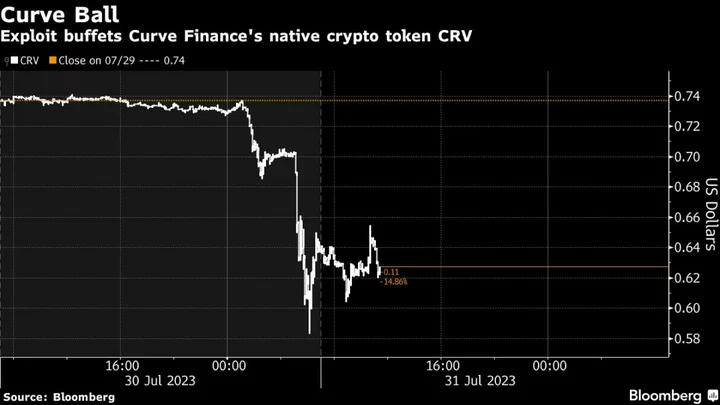
South African Electricity Minister Attacks Climate Finance Pact
South Africa’s electricity minister attacked the country’s groundbreaking $8.5 billion climate finance pact with some of the world’s
2023-07-25 18:45

Crypto Token of Key DeFi Exchange Curve Finance Sinks After Exploit
The native token of one of crypto’s top decentralized exchanges tumbled after the platform said it had been
2023-07-31 09:59

Boostio: EG 'Valorant' star grateful to xQc as he achieves stardom accidentally
Kelden ‘Boostio’ Pupello and Max ‘Demon1’ Mazanov emerged as key players during this pivotal moment for the team
2023-05-26 17:47

Threads: Instagram app reaches 70 million sign-ups as it hurtles towards the size of Twitter
Threads, Instagram’s new Twitter rival, has now hit 70 million sign-ups, parent company Meta has said. The app is now easily the fastest-growing app in the world, and has seen the fastest growth of any app ever. That position was originally held by ChatGPT, but it took a couple of months for that app to reach 100 million users. It also means that Threads is well on its way to the size of Twitter, its rival. That app had 229 million monthly active users in May 2022, according to a statement made before Elon Musk’s buyout latest last year. Meta revealed the latest sign-up numbers as it looked to highlight high-profile early adopters, including Selena Gomez, Khloe Kardashian and Lewis Hamilton. It did not reveal how many posts had been made on the site, though that is already likely to be in the hundreds of millions. Meta launched Threads – which uses Instagram branding and borrows accounts from the platform – late on Wednesday. Since then it has been growing quickly, with the number of users seemingly doubling every few hours. Dubbed as the “Twitter-Killer”, Threads was the top free app on Apple’s App Store in the UK and US on Thursday. Its arrival comes after Meta chief executive Mark Zuckerberg and Twitter’s Musk have traded barbs for months, even threatening to fight each other in a real-life mixed martial arts cage match in Las Vegas. “The cage match has started, and Zuckerberg delivered a major blow. In many ways, it’s exactly what you’d expect from Meta: Stellar execution and an easy-to-navigate user interface,” Insider Intelligence principal analyst Jasmine Enberg said. Twitter responded on Thursday by threatening to sue Meta, according to the publication Semafor, citing a letter delivered to Zuckerberg by a lawyer for Twitter. Twitter was not immediately available for comment. Reuters could not immediately verify the Semafor report. Meta said no one on the Threads engineering team is a former Twitter employee. Numerous competitors to Twitter have sprung up following Musk’s $44 billion purchase of the social media platform last year, which was followed by a series of chaotic decisions that have alienated both users and advertisers. Musk’s latest move involved limiting the number of tweets users can read per day. Twitter’s stumbles make room for a well-funded competitor like Meta Platforms, analysts and experts said, particularly because of its access to Instagram users and its advertising strength. “Meta’s release of Threads came at the perfect time to give it a fighting chance to unseat Twitter,” said Niklas Myhr, professor of marketing at Chapman University, referring to the turmoil at Twitter after it limited the number of tweets users can see. “Threads will be off to a running start as it is built upon the Instagram platform with its massive user base and if users adopt Threads, advertisers will be following closely behind.” Other competitors have found limited success. Mastodon, another Twitter-like app, has 1.7 million monthly active users, according to its website, while Twitter co-founder Jack Dorsey-backed Bluesky has about 265,000 users. Read More People are realising something really worrying about Threads Twitter threatens legal action against Meta over new ‘Threads’ app Meta responds to Musk’s threat as Threads becomes most rapidly downloaded app Musk, Zuckerberg and the chaotic fight to succeed Twitter Kim Kardashian, Rylan Clark and Dalai Lama among those joining new app Threads Threads is already more than three times bigger than every Twitter rival combined
2023-07-08 01:18

'The View' host Ana Navarro slammed for calling X a 'hellscape app'
Ana Navarro took a dig at the app while reposting an 'adorable' video she came across
2023-09-10 10:55

Xbox announced a new Series S, and it's up for preorder
One of the best deals in gaming just got a huge upgrade. That's right, there's
2023-06-17 00:45

Did the Nemesis AR Get Buffed in Apex Legends?
The Nemesis AR got secretly buffed in Apex Legends Season 18 despite nerfs to its damage and recoil in the Harbingers Collection Event patch.
2023-10-03 23:25

Thoma Bravo Nears Deal for NextGen Healthcare
Thoma Bravo is in advanced talks to buy software company NextGen Healthcare Inc., according to people familiar with
2023-09-05 09:45

Miami’s Overflowing Septic Tanks and Trash Piles Test Appeal to Rich
Miami wants to attract even more out-of-state workers and wealthy newcomers like hedge fund tycoon Ken Griffin. But
2023-07-31 18:17

We rounded up all of Amazon's best Memorial Day deals
Memorial Day weekend is a time to rest and shop. And what better way to
2023-05-27 02:48

How Much is the Asus ROG Ally?
How much is the newest handheld gaming device
2023-06-21 05:16

EU Nominee for Climate Chief Vows to Continue Green Shift
The European Union’s climate commissioner-designate pledged to complete the bloc’s plan to reduce emissions if he’s permanently approved
2023-10-03 09:28
You Might Like...

OMNIVISION and iCatch Technology Partner to Enhance Video Doorbell with Color Pre-roll Capability

Voyager 2: Nasa receives ‘heartbeat’ signal from missing spacecraft

Blackboxstocks Joins Forces with GoNoGo Charts to Provide the Ultimate Trend Indicator for Traders

Climate nears point of no return as land, sea temperatures break records -experts

Google to scrap local news links in Canada over Online News Act

How to Play PC Games on Mac (Without Installing Windows)

Cut down on costs and e-waste with a refurbished iPad Air, only $180

Microsoft changes its takeover of Call of Duty developer in attempt to get it approved
